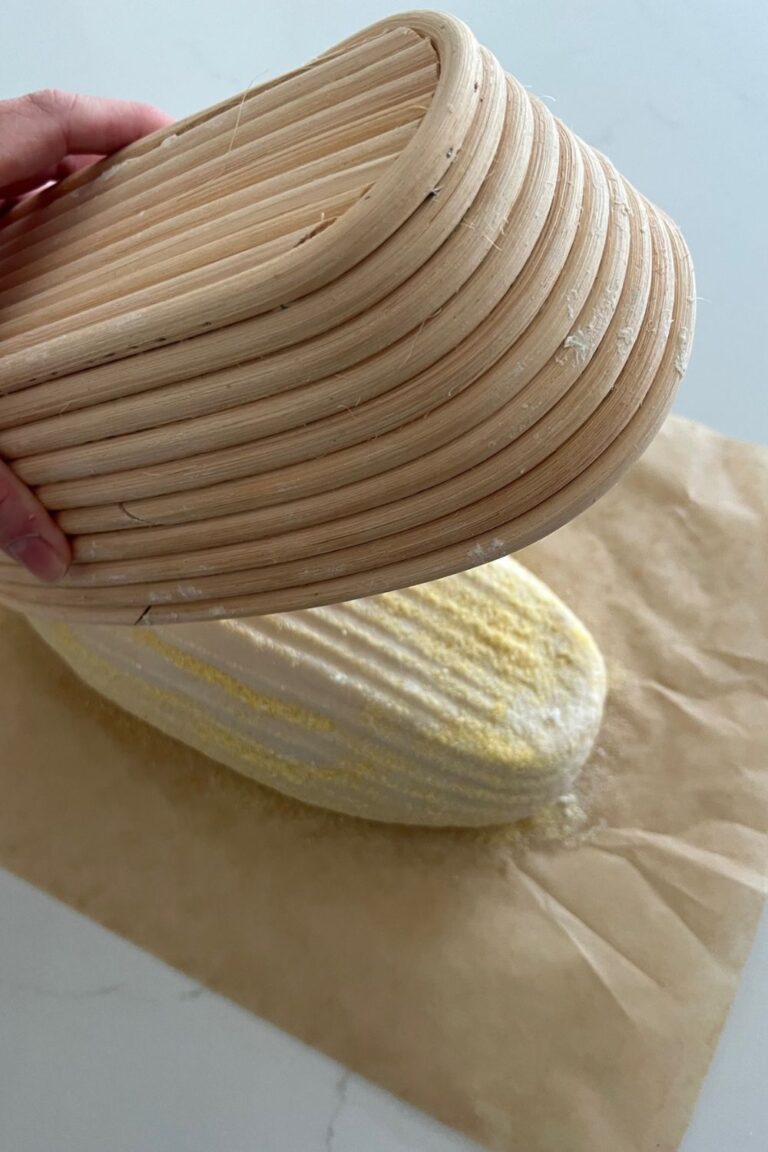Best Flour for Sourdough Pizza: Is Tipo 00 Really Needed?
This post may contain affiliate links.
Wondering about the best flour for sourdough pizza dough? You've come to the right place! Just like making sourdough bread, the quality and type of flour you use makes a huge difference to the outcome of your pizza.
Great sourdough pizza dough requires good gluten development and higher hydration to give you a stretchy dough that results in a crispy crust and chewy interior - and don't forget the air bubbles!
If you use best flour for sourdough pizza, you'll end up with a lovely, elastic dough that can be easily shaped into pizza - ready to top with your favorite toppings!
There are a few flour options when making sourdough pizza, all of which are explained in this post.
If you're looking for the best sourdough pizza crust recipe, you'll find my quick sourdough pizza dough recipe here - it's an absolute winner and has been tried and tested hundreds of times! Want even more sourdough pizza recipes? Then maybe you'll like this stand mixer sourdough pizza recipe or this sourdough fougasse recipe! It's so easy!

Best Flour for Sourdough Pizza?
To be honest, this can be a tricky question as there really are so many different types of flour out there.
Simple answer - Tipo 00 Flour is generally the best flour for pizza dough, however, for sourdough pizza dough, bread flour is a better option because it will give you stretchier, chewier dough and allows you to add a little more water. Higher hydration dough will give you a bubblier, crunchier crust.
I've broken down the main types of flour and what their effect would be on homemade sourdough pizza crust below:
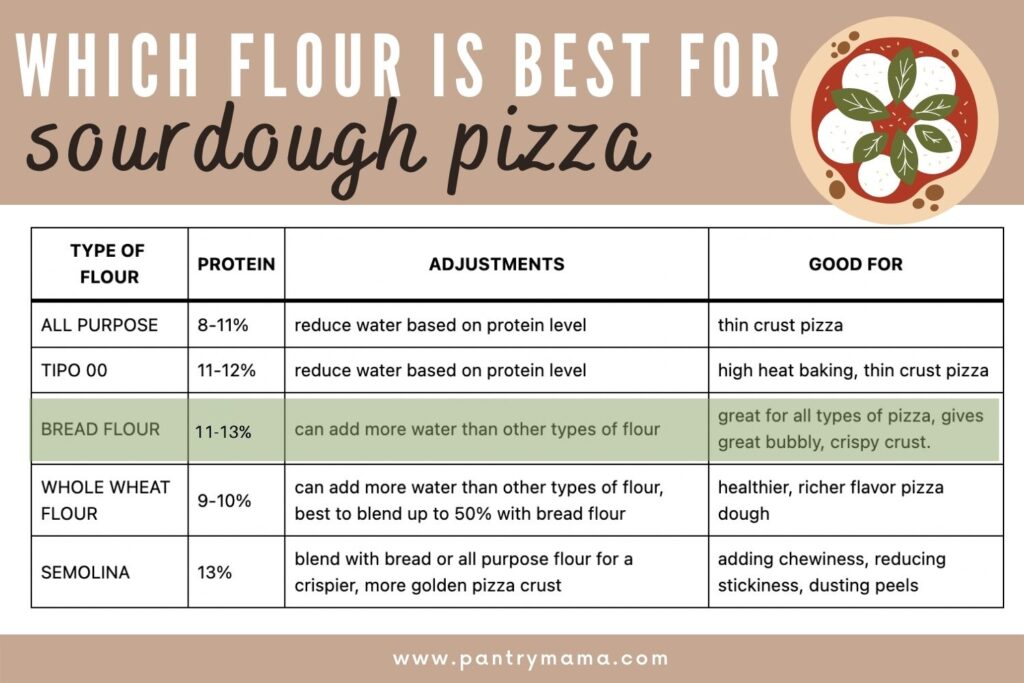
Bread Flour
Bread flour is the best for making sourdough pizza dough because it has a higher protein content and gives better gluten development. Sourdough pizza dough needs excellent gluten development because we want that strong gluten network to hold in all those precious bubbles of gas we've cultivated.
Typically bread flour has a protein content between 11 and 13%. This means that it can absorb a bit more water, giving you a higher hydration pizza dough that can be baked in a hot oven.
I only ever use bread flour to make sourdough pizza crust. I use a pizza peel generously sprinkled in semolina flour (see more about this below). This ensures that I can easily transfer my sourdough pizza from the peel onto the pizza stone inside my gas fired pizza oven.
Bread flour gives you the best flexibility with your pizza dough giving you the option of having a thin crust, thicker chewy crust or anything in between. I have found that I'm able to use my bread flour based sourdough pizza dough for thin and crispy pizzas, as well as deep dish pizzas cooked in a cast iron skillet with no issues. They also bake well on a baking steel or on a baking sheet.
Tipo 00 Flour
Tipo 00 Flour is a very finely ground flour that absorbs less water than a more coarsely ground flour. "Tipo 00" does not refer to gluten or protein levels in the flour, but actually the grind.
It is commonly used to make pizza dough because it absorbs less water and is suitable for cooking at high temperatures - perfect for pizza dough cooked in wood fired pizza oven.
Many pizzerias and professional pizza bakers use Tipo 00 for their pizza recipes.
As a home baker, I don't think you need to use Tipo 00 to get the best results. You can use your own sourdough starter along with bread flour to make a successful sourdough pizza.
All Purpose Flour
All Purpose Flour (or plain flour) is exactly as it sounds. It's an all rounder type flour that can be used for many things. It's a great flour for the home baker to have on hand as it will lend itself to many purposes.
That being said, you can use All Purpose Flour to make sourdough pizza dough. Particularly a higher protein all purpose flour like King Arthur All Purpose (11.7%) as it will behave in many ways like bread flour would.
All Purpose Flour is generally around 8 to 11% in protein, but brands like King Arthur and Canadian brands will measure up to 13% in protein.
When making pizza with All Purpose Flour it's important to remember that all purpose flour will not cope with high hydration recipes (particularly those on the lower protein levels), so you will need to reduce the water content in the dough for the best end result.
All purpose flour is best for thinner crust sourdough pizza crusts.
You can read about the effect of all purpose flour on sourdough bread here.
Whole Wheat Flour
Whole wheat flour can be used however it is not the best flour for sourdough pizza dough. Whole wheat flour is coarser than bread flour or Tipo 00 because it contains some of the wheat germ. If you run whole wheat flour through a sieve you'll be able to see this left behind.
This wheat germ can affect gluten development, meaning that you won't get as much stretch and elasticity with a whole wheat sourdough pizza dough.
The best solution to this is to blend your flour - so you could do half whole wheat and half bread flour. This gives you a nice compromise on gluten development while still getting the health benefits of whole wheat flour for your homemade pizza.
This is a similar technique to this whole wheat rye sourdough bread.
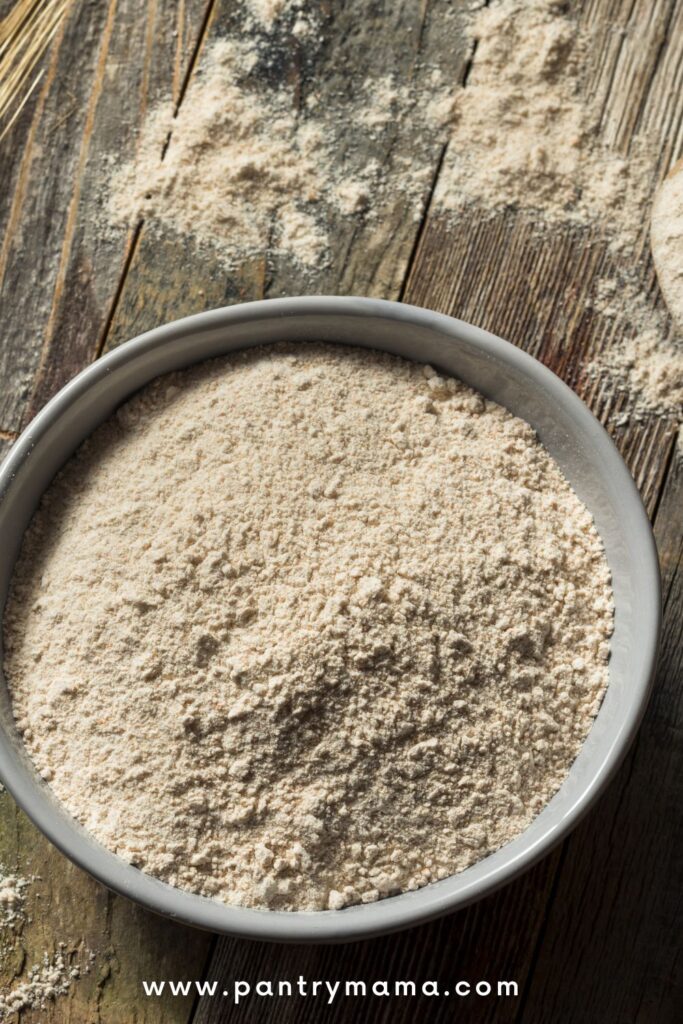
Semolina Flour
Semolina is a popular choice when it comes to pizza because it is high in protein at 13%. Semolina is a coarse flour made from durum wheat. It's generally yellow in color and you can buy it in varying grades, from fine to coarse.
I really love using fine milled semolina in my pizza dough and for dusting pizza peels. I substitute up to 100g of bread flour for semolina in my dough. It's also great for blending with all purpose to increase it's protein levels (substitute up to 200g of your all purpose flour in a pizza recipe).
Semolina gives your sourdough pizza a crispy bottom and chewy texture! It's absolute gold when it comes to pizza!

Can you make pizza only with semolina flour?
No you shouldn't use only semolina flour to make pizza dough with. You will need to blend it with all purpose, bread flour or tipo 00 for the best result. Semolina gives your pizza lovely, crispy bottom and chewy bite!
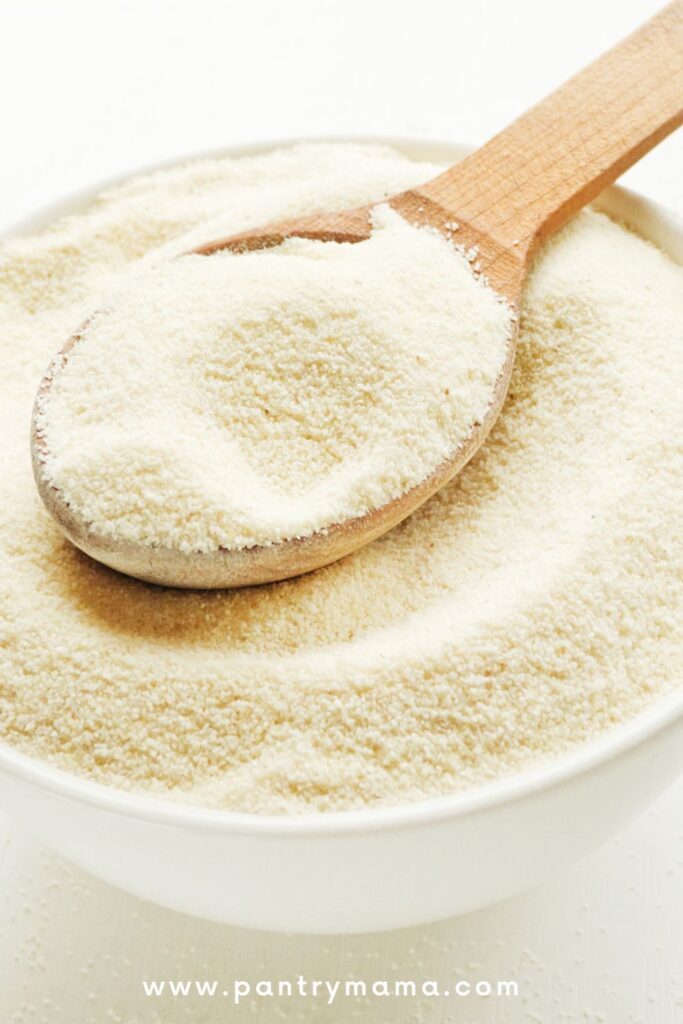
Water Absorption is Important
The water absorption rate of the flour you use is important for pizza dough. Tipo 00 flour is widely used for pizza dough because if actually absorbs less water.
If you're using bread flour (like I do for my pizza) you would generally use more water because it has a higher absorption rate. This is important because sourdough pizza needs to be a bit higher in hydration to make great pizza.
Just like sourdough bread, sourdough pizza requires the right amount of water for all those gorgeous CO2 bubbles to form. If you don't add enough water to the pizza dough, it will be dry, won't stretch very well and won't bake up in the bubbly, delicious way a sourdough pizza should!
It's absolutely ok to adjust the water amount in your pizza dough to suit the flour you're using. Pizza dough should be tacky, stretchy and very elastic.
Gluten Development Makes A Difference to Sourdough Pizza
Gluten development refers to the process that occurs when flour comes into content with water (but can also work with any liquid like coffee, tea or even juice).
Gluten is a protein which forms a "chain" or "network". It is this network which holds in all the CO2 produced by the yeast in your dough. Therefore a strong gluten network is key to the bubbly crust when making sourdough pizza.
If you are using flour with a lower protein (like all purpose), you won't necessarily get those bubbles because the gluten network won't be strong enough to support the air bubbles.
Bread flour produces a strong gluten network because it has a higher protein level. However, for gluten to form sufficiently, it does have to be correctly hydrated.
This is why it's important to know how much water to add to your flour. Too little water will stunt the gluten development and not enable the proteins in the flour to form those strong gluten chains.
You can read about the differences between gluten development in bread and pizza dough here.

Can You Add Commercial Yeast to Sourdough Pizza Dough?
Absolutely you can add commercial yeast to sourdough pizza dough if you want to. This is a great option if you want to make sourdough pizza, but you are short on time. Or maybe your own sourdough starter is not quite as active as it could be (or it's simply too young).
All of these are good reasons to add some commercial yeast to your sourdough pizza dough.
You can find instructions for how to add commercial yeast to sourdough pizza dough here.
Tips for the Best Sourdough Pizza Crust
- Make sure your dough goes through bulk fermentation at room temperature. While you can put sourdough pizza dough in the fridge, the bulk fermentation needs to be done at room temp to ensure the best result once baked.
- Try to avoid using a rolling pin when shaping your dough. This can flatten out all those gorgeous bubbles.
- Weigh out your dough balls before you shape your dough so that you have equal pieces of dough. This will ensure all your pizzas are of equal size and cook evenly.
- Sourdough pizza dough can be a softer dough so don't be afraid to use some semolina flour to enable you to shape the soft dough.
- The best way to avoid a soggy middle to your sourdough pizza base is to par bake your pizza bases.
You'll find my full recipe for sourdough pizza here - complete with lots of tips and tricks for the best result!!
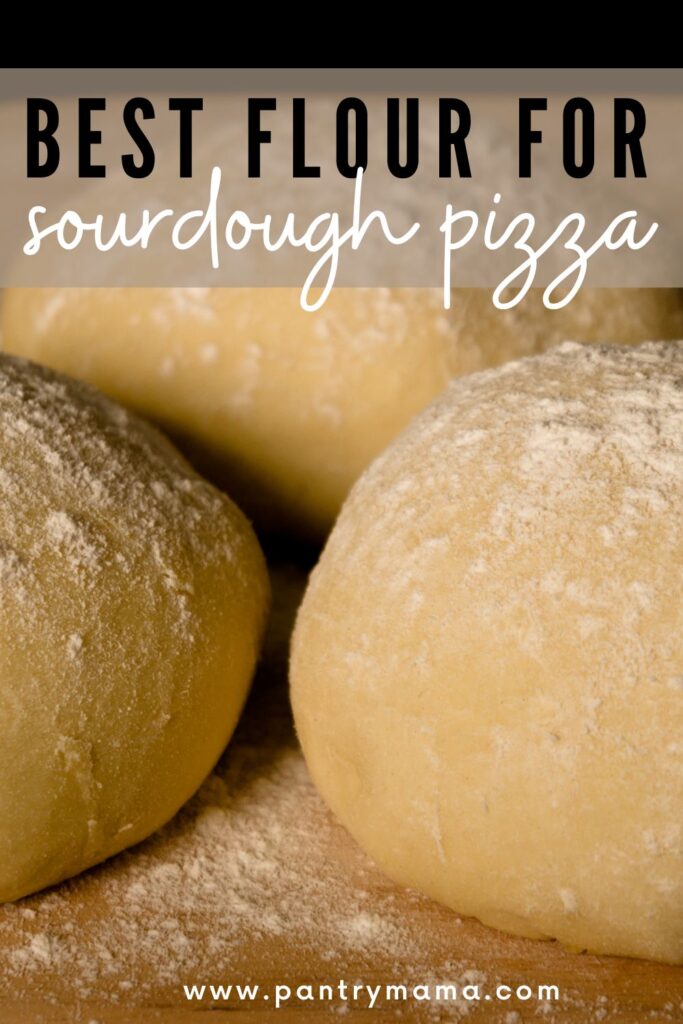

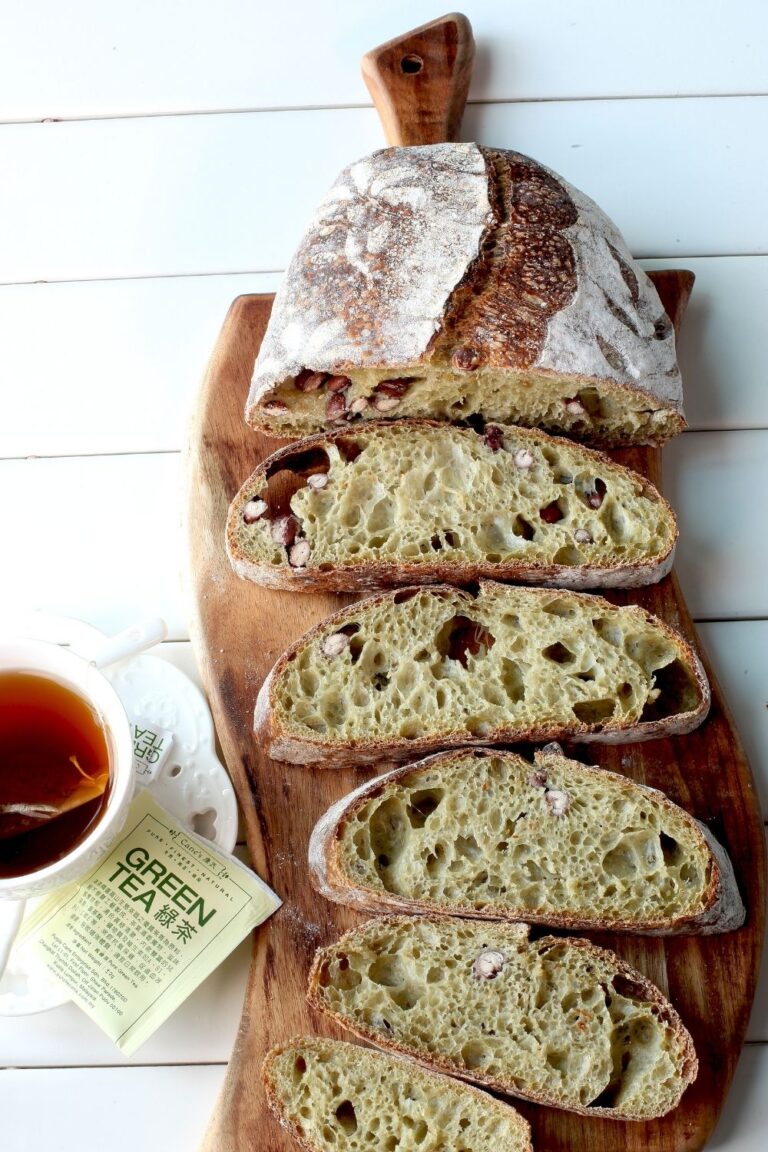
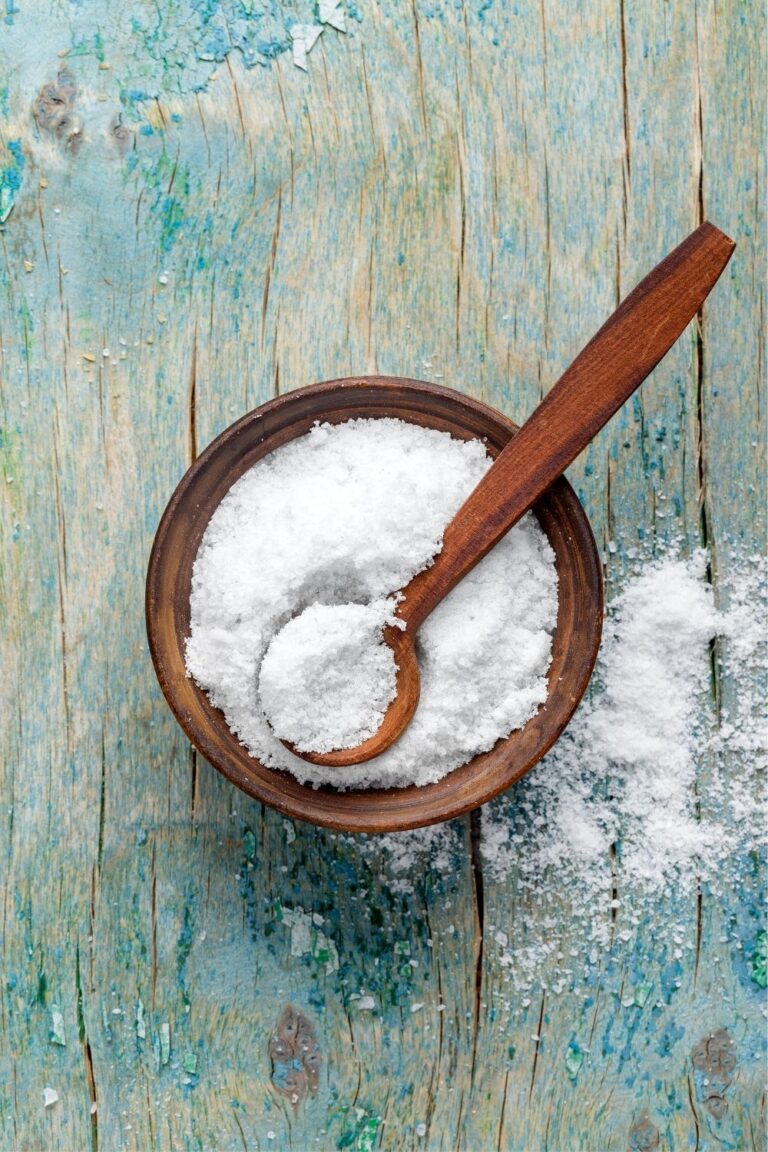
![How to Properly Store Flour [Short and Long Term Solutions]](https://www.pantrymama.com/wp-content/uploads/2022/03/HOW-TO-PROPERLY-STORE-FLOUR-LONG-AND-SHORT-TERM-SOLUTIONS-1-768x1152.jpg)
